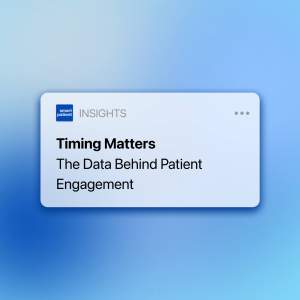Pharma Innovate Treatment Launch Excellence: Getting Patients to Ask the Right Questions
Innovative treatments can face prescription hurdles upon launch, with doctors often reluctant to prescribe new treatments early on. This can lead to patients not receiving the most effective treatment and pharma’s new products suffering commercially. Here is how getting patients to ask the right questions can help

- Innovative new treatments can face prescription hurdles upon launch, with doctors often sticking to “tried and tested” products they are familiar with
- Pharma largely avoids engaging patients for fear of breaching advertising restriction, ignoring one of the primary influences on doctors’ prescription decisions
- By running education and awareness campaigns, pharma can encourage patients to ask their doctors the right questions – remaining 100% compliant
While some new treatments hit the ground running, many of pharma’s innovative products suffer from a reluctance among healthcare professionals to avoid prescribing treatments they are unfamiliar with. This can result in patients being undertreated – as demonstrated by the low use of biologics to treat psoriasis – and harm the commercial success of pharma’s innovative treatments. Read how targeted education and awareness campaigns can help encourage patients to ask their doctors the right questions about innovative therapies, and how pharma can run them compliantly.
Why Pharma’s Innovative Treatments Struggle Upon Launch
No matter how effective an innovative treatment might be, it can only help patients if it is prescribed by physicians. However, there is a well-established reluctance among some healthcare professionals to prescribe new treatments that have a different mechanism of action to existing “tried and tested” products.
The result is undertreatment in certain therapeutic areas and patients not receiving the best possible treatment, particularly when an innovative product fills a previously unmet medical need. It is a situation we have previously discussed regarding psoriasis. In that post, we discussed how nearly 30% of people living with moderate psoriasis and over 20% of people living with severe psoriasis are being treated with topical agents alone, despite innovative biologic therapies having the potential to provide 100% clear skin. Not surprisingly, almost half of people living with psoriasis are claimed to be dissatisfied with their treatment.
Not wanting the hassle of explanations and safety discussions, a lack of exposure to the new treatment during residency training, outdated safety concerns, and inconvenience were all cited as reasons behind the reluctance of doctors to prescribe biologics.
This phenomenon is not restricted to psoriasis. Any new pharmaceutical product, particularly innovative treatments, can suffer from skepticism and a perceived lack of safety information. In such situations, it can take years for a new treatment to gain widespread acceptance (if it ever does).
Not only does this reduce the quality of the care patients receive, it has obvious commercial consequences for pharma.
Pharma Ignores a Major Piece of the Puzzle by Not Engaging Patients
There are many influences behind the decisions physicians make when prescribing treatments. According to one review, “the decision to initiate a new drug is heavily influenced by ‘who says what’, in particular the pharmaceutical industry, hospital consultants, and patients. The decision to ‘adopt’ a new drug is clinched by subsequent personal clinical experience.”
Pharma has long directed its efforts to engage doctors and other decision-makers within the healthcare industry. Outside the US, however, advertising restrictions for prescription medications have meant pharma has typically ignored the ‘patients’ part of the puzzle.
However, there is a distinct difference between marketing toward patients and providing educational content that can help raise awareness of important treatment-related topics. When done properly, patient-facing content is compliant in even the most stringent of markets. In providing compliant content, pharma can help raise awareness of treatment advancements in any therapeutic area.
While not all new treatments will be suitable for all patients, it is essential for pharma to educate patients and help them ask the right questions of their doctors. By giving patients the tools to play an active role in their treatment, pharma can help overcome some of the challenges new and innovative products face upon launch.
Activating patients in this manner helps pharma address one of the biggest missing pieces of the launch excellence puzzle.
How to Run Compliant Content Campaigns That Reach Patients
Pharma has run patient activation campaigns for years. However, the truth is that many are still following an outdated model of throwing money at a marketing agency to promote content on a generic website.
Ultimately, this means pharma gains little insight into who they are reaching.
Our MyTherapy userbase combined with modern performance marketing methods allows us to run education and awareness campaigns that reach specific patient populations and delivers in-depth analytical data. In doing so, our model means pharma can be confident that such campaigns are engaging a relevant audience.
Our experience in running content campaigns globally and know-how when it comes to topics such as Medical, Legal, and Regulatory (MLR) reviews means we can achieve this without falling foul of advertising restrictions.
Combined, these factors mean that education and awareness campaigns can form an integral part of pharma’s launch strategy for new, innovative products, and help ensure that patients have open and informed discussions with their doctors regarding treatment options.
If you want to learn more about our approach to content campaigns, don’t hesitate to get in touch or book a meeting.





